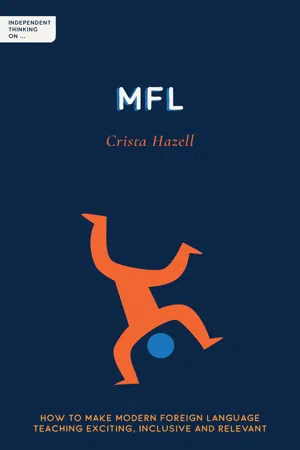
Independent Thinking on MFL
How to make modern foreign language teaching exciting, inclusive and relevant
- 200 pages
- English
- ePUB (mobile friendly)
- Available on iOS & Android
Independent Thinking on MFL
How to make modern foreign language teaching exciting, inclusive and relevant
About This Book
Crista Hazell's Independent Thinking on MFL: How to make modern foreign language teaching exciting, inclusive and relevant takes teachers on a tour of how to get the teaching of a new language right.
Foreword by Ian Gilbert.
Learning a new language has the power to transform a life, as well as help break down the barriers that seem to be re-emerging between nations, cultures and people.
In the UK, MFL teaching has always had to battle with the 'everyone speaks English' argument, not to mention that, for so many, all that remains of their years learning a foreign language is bitte, por favor or s'il vous plait.
But with teachers like Independent Thinking Associate Crista Hazell at the front of the class, things can be very different.
Drawing on her many years of experience as an MFL teacher and head of department, Crista shares tips, techniques and inspirational ideas geared to help teachers build confidence, increase enjoyment and improve outcomes as they take their MFL teaching to a whole new level.
Crista provides a range of strategies from how to hook students in the minute they enter the classroom to ensuring that the vocabulary sticks designed to help learners develop confidence, take risks and enjoy the challenge that learning a new language brings. She also offers ideas and advice on how to make learning new vocabulary and grammar a great deal more effective and empowers teachers to open up the benefits and enjoyment of learning a language to all students, not just those in the top sets.
Ultimately, however, her book sets out to help teachers create engaging, relevant and memorable learning experiences in the MFL classroom and encourage their learners to become lifelong and passionate linguists.
For MFL teachers and heads of languages departments in primary schools, secondary schools and colleges.
Independent Thinking on MFL has been shortlisted for the Educational Book Award in the 2021 Education Resources Awards!
Frequently asked questions
Information
HOOK THEM INTO LEARNING

Table of contents
- Praise
- Title Page
- Foreword
- Acknowledgements
- Contents
- First Thoughts
- Chapter 1: Hook them into learning
- Chapter 2: Welcome them with a Привет
- Chapter 3: Language skills and oracy
- Chapter 4: Reading
- Chapter 5: Listening
- Chapter 6: Creativity in MFL
- Chapter 7: The awesome power of lucky socks
- Chapter 8: How to make best use of your foreign language assistant and teaching assistant
- Chapter 9: Why is MFL a subject worth teaching?
- Chapter 10: Information for trainees, NQTs and RQTs
- Chapter 11: MFL and the wider world
- References and Further Reading
- Copyright
- Advertisement